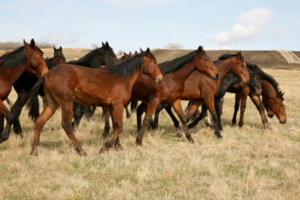
by Nicole Rivard
The cost of adopting a wild horse from the Bureau of Land Management (BLM): $125.
The amount of money the BLM is now proposing to give people to adopt a wild horse: $1,000.
A wild horse’s freedom: Priceless.
That’s why I’m sickened by BLM’s recent report to Congress outlining management options for a “sustainable wild horse and burro program.” It really shows its true colors—that it evolved from the United States Grazing Service, which as the name suggests, catered to cattle and sheep ranchers.
The “report” calls for massive removals, permanent sterilization, sale without limitation and slaughter. It even mentions that at the National Wild Horse and Burro Summit in August, there was overwhelming support for commercial use of wild horses for pet food and to feed zoo animals.
It also proposes giving $1,000 to anyone willing to adopt a horse. While it might sound better than the other options, it’s actually a horrible idea.
Last week, K5NEWS in Seattle featured a segment about professional horse trainer Michelle Miner, who agrees with me. She said that the plan endangers the horses and the people who might think they are making some easy cash adopting one.
She’s right. Such a plan would leave the door open for people with dollar signs in their eyes who know nothing about horse training and could care less about the well-being of wild horses to make some money while deflecting BLM’s years of incompetence in protecting wild horses on public lands.
The trainer, who spends a minimum of four hours a day training a wild horse, said the plan endangers the horses and the people who might think they’re making money adopting one.
“They don’t react like a domestic horse. They are a wild animal. They will always be a wild animal,” the trainer said.
Once these wild horses enter the domestic market there is a good chance they will face abuse and neglect. Wild horses are labelled as combative—but the only thing they know is to defend themselves and their families.
In fact, the book Last Chance Mustang, which I read in 2015, documents the story of Samson, a formerly free-roaming, still wild-at-heart American mustang that was plucked from his mountainous Nevada home and thrown into the domestic horse world where he was brutalized and victimized. After years of abuse, Samson had evolved into a hateful and hated, maladjusted horse until the day he found his way to a rural Illinois farm, an ill-equipped owner, and one last chance, when the owner turned to trainer Mitch Bornstein whose task was to gentle the violent horse whose best defense had become offense.
When I interviewed Bernstein, who now cares for Samson, he said Samson’s story should beg the question, who will be held accountable for the animal abuse caused by the BLM’s adoption program?
You have a program that basically says take the horses—we are overburdened, we don’t want them and who cares what you do with them. Bornstein said he never heard from any adopters that the BLM showed up at their barn for a compliance check. His opinion is that there isn’t any oversight.
He also told me he doesn’t think the adoption program started as ‘Own a piece of Americana’ like they tout it. He thinks it was, ‘Oh crap, these horses are filling up these mud lots so let’s give them away.’
Bornstein is right. The BLM isn’t sending out the message to treat these horses with care. It’s more like a Kmart blue-light special. Like we are overstocked.
The program started broken, and this latest report proves it still is. And giving ill-equipped adopters money for horses is not going to fix anything—you can’t throw a wild horse in a trailer and command him or her to be a domestic horse for $1,000. Owning a wild horse is a big investment in emotion, time and money. (Friends of Animals spent $5,080 just for three months of training so two of the wild horses we rescued would begin to trust new leaders, such as care staff, a vet and a farrier.)
Being a wild horse has already cost Samson and his kin so much in the domestic market. Enough is enough.
We need an honest discussion in Congress about reforming laws that allow for unbridled development at the expense of wildlife—not more horrific extinction plans by the BLM.
“What bothers me the most after doing all this research (for the book) is that we are managing a national treasure based on methodology and statistics that are not only outdated but were promoted by special interests,” Bornstein said. “We don’t have a wild horse problem. We have a BLM problem.”
I couldn’t agree more.
Nicole Rivard is editor of Friends of Animal’s quarterly magazine Action Line. She brings 18 years of journalism experience to the front lines, protesting and documenting atrocities against animals.
